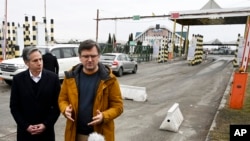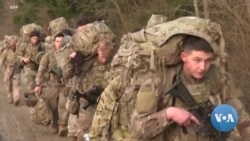Hundreds of troops from the U.S. 82nd Airborne Division have deployed in the forested mountains of eastern Poland, just a few kilometers from the Ukrainian border. That puts them in close proximity to recent Russian airstrikes on targets in western Ukraine.
The contingent is part of a wider deployment of some 5,000 U.S. troops sent to Poland in recent weeks and is in addition to the 4,000 American soldiers already in the country.
NATO has said the deployments send a message to Moscow: that the alliance will defend "every inch" of its territory.
Hotline
However, there are growing concerns of an accidental engagement between the U.S. and Russia. Communication channels have been set up to avoid that scenario.
There are also fears that NATO troops in eastern Europe could be targeted in the event of escalation. Russia's President Vladimir Putin last month raised the alert level of its nuclear forces, in response to what he described as NATO's "aggressive statements."
"NATO still is saying that it will not intervene on Ukrainian territory, but increasingly Western weapons are flowing into Ukraine through NATO member states," notes Constanze Stelzenmüller, a senior fellow at the Washington-based Brookings Institution.
"It is possible that Putin will, or in fact already sees such military support – which it has to be said on our side is not particularly controlled or accompanied by careful messaging – as NATO joining the fight. In other words, the discussion, to some degree, is now about whether Putin would be willing to use tactical nuclear weapons against NATO forces on NATO territory. That would be a new world," Stelzenmüller told The Associated Press.
'Nuclear blackmail'
The alliance must not let Putin get away with nuclear blackmail, says Fabrice Pothier, a former head of policy planning at NATO.
"I think it's a huge mistake to have, so far, left Putin unchecked on his nuclear blackmailing. And I'll tell you why. I think accepting the Putin nuclear red line, which is essentially, 'I do whatever I want within that specific area of operation (Ukraine), if not I am to use strategic weapons' – not pushing back is a huge mistake, because what will stop Putin from doing the same next time, possibly including against a NATO ally?"
NATO has repeatedly said it will not get directly involved in the conflict. Pothier says the alliance should do more.
"Are we fully aware of the danger of not doing anything? If I look at that recent history, actually the risk of standing on the sidelines and clamouring that we are covering the NATO allies' backs but our mission stops at the NATO border, that risk I think is no longer acceptable."
Flashpoint
Ukraine's border with Poland has become the major gateway for refugees fleeing the conflict. It is also becoming a key strategic frontier: a conduit for NATO weapons heading into Ukraine and a potential future flashpoint.
For decades, Ukraine has acted as a buffer zone between Russia and NATO. But if the Kremlin's forces seize all of Ukraine, there is little to separate NATO troops and Russian soldiers. At Arlamów, and along much of the frontier, there is no border fence – just mountains and forests.







